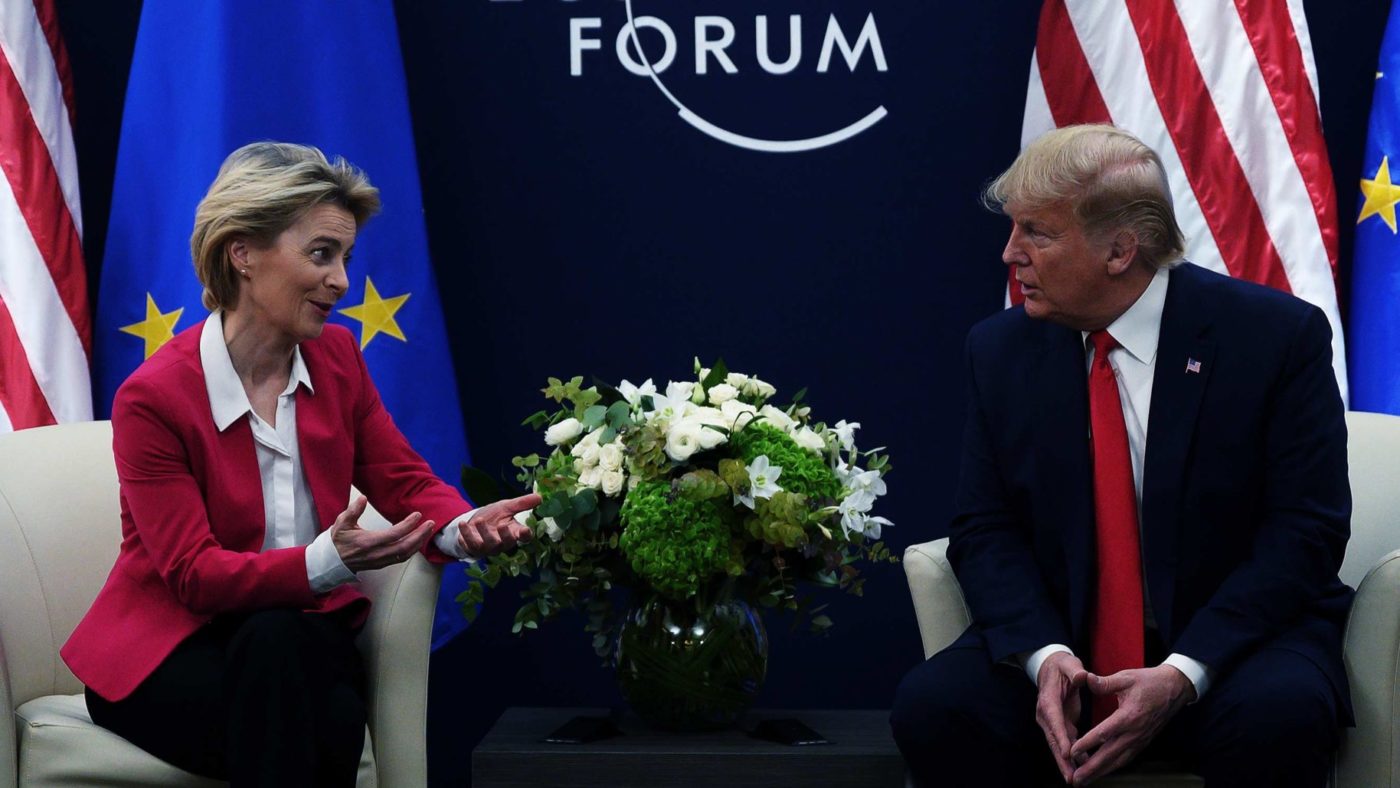Donald Trump’s pronouncements are so riddled with half-baked conspiracy theories that debunking them has turned into something of a journalistic pastime. Sometimes, though, he does inadvertently come out with something that merits closer inspection – such as his recent claim that the European Union was “formed to take advantage of the US”.
What Trump means by “taking advantage” is clear enough – he’s already made clear his frustration with European countries’ under-spending on defence and the EU’s thinly-veiled trade protectionism. American fatigue about these imbalances long pre-dates Trump, but the President’s consistent attacks on these issues have soured the transatlantic relationship to an extent perhaps not seen since the Iraq War of 2003. Meanwhile, Trump’s base praises him for being ‘tough with the Europeans’.
On defence, he certainly has a point. EU leaders have long extolled the virtues of transatlantic cooperation to distract from their failure to hit the Nato target of spending 2% of GDP on their militaries. On trade too, there is ample cause for complaint about the EU’s strange mixture of criticising protectionism abroad while clinging to high trade barrier and state subsidies at home. When Trump threatened to match the EU’s auto and agricultural tariffs with America’s own, European leaders wailed about protectionism while doggedly refusing to given any ground.
That gets to the contradiction at the heart of the European project, which trumpets its status as a free-trade bloc while also operating a customs union. Indeed, it’s exactly the high levels of market harmonisation that member states enjoy internally which make life so difficult for outsiders — if the EU has a mantra it’s ‘free trade for thee but not for me’. Then there’s the special zeal with which European regulators pursue Ameriican multinationals – something Columbia University’s Anu Bradford labels the ‘Brussels effect‘.
In short, penalising America is the unquestionable outcome of a number of EU policies, but the President’s claim that the EU was deliberately formed with that in mind is flimsy at best. A cursory look at the bloc’s history shows that taking advantage of the US was never the EU’s raison d’être, but instead the gradual result of a broader free-riding, self-infantilising mindset the bloc’s leaders have come to embrace.
In fact, the EU’s genesis was shaped in large part by American patronage. Ironically, the fact that the US played an often unseen role in promoting European integration has bred a parallel European conspiracy that the EU is actually an American plot to subvert the old continent.
Of course, neither of these outlandish theories stands up to any kind of scrutiny. The truth is that the US was neither a self-interested author of the European project, nor its unwitting victim.
Nowhere is the anti-American ferment stronger than in France, where it dates all the way back to World War II, when the US and Britain dragged their feet over recognising De Gaulle’s Forces Françaises Libres (FFL) as the official government-in-exile. After the war, De Gaulle remained suspicious that America’s role in securing European peace and prosperity would come at France’s expense. This suspicion reached fever pitches with the US-EU nuclear power agreement of 1956—which he dreaded would erode France’s nuclear prowess while undermining its energy independence—and America’s siding with Egypt’s Nasser over France and the UK in the Suez crisis.
That Gaullist scepticism applies just as much to the EU. And a hostility to both American hegemony and EU supranationalism marry neatly in the idea that the bloc is a sinister US plot to undermine European nations – an outcome which would only be to France’s cost. The ever-suspicious De Gaulle even viewed the Marshall plan with a wary eye, describing in his memoirs the economic conditions attached to it – namely openness to American exports – as a neo-colonial plot to subdue Europe to American corporate interests.
Like Trump’s, De Gaulle’s conspiracies weren’t entirely off-base. The CIA was later proven to have influenced the EU’s so-called “Founding Fathers” in steering its original six member states towards forming the European Coal and Steel Community and both Jean Monnet and Robert Schuman were revealed to have received a string of dubious donations from US federal agencies and other non-profits. Recently declassified State Department and CIA wires also speak of the US interest in an “executive Commission” to drive pan-European market-harmonisation policies without the democratic accountability of a federally-elected body, making it easier for US corporate interests to lobby. Today’s European Commission certainly fits the bill there.
The driving purpose behind these seeming acts of foreign interference, however, wasn’t any secret plot to undermine Europe but America’s desire to secure its key post-war aims for the continent: peace, Soviet containment and economic recovery. This was a case made quite publicly through channels such as the American Committee on United Europe (ACUE), a privately-funded advocacy group that lobbied for European integration as the only possible bulwark against Soviet influence. Nor can the Americans credibly be claimed to be the driving force for how the bloc has developed in the decades since.
Trump’s own pet theory about the EU being founded to undermine America emanates from the same kind of fact-free hostility. Still, there’s no escaping the fact of America’s gradual reversal of fortune, from a distant patron to a collateral loser from the European project. That’s the ugly truth that European leaders need to heed, that for too long they have been getting away with freeloading on American largesse and naivete. Likewise, Trump would do better to drop the conspiracy theorising and concentrate on redressing the imbalance in transatlantic relations.
There’s a better Trump quote to sum this up: ‘I want Europe to pay’.
Click here to subscribe to our daily briefing – the best pieces from CapX and across the web.
CapX depends on the generosity of its readers. If you value what we do, please consider making a donation.


